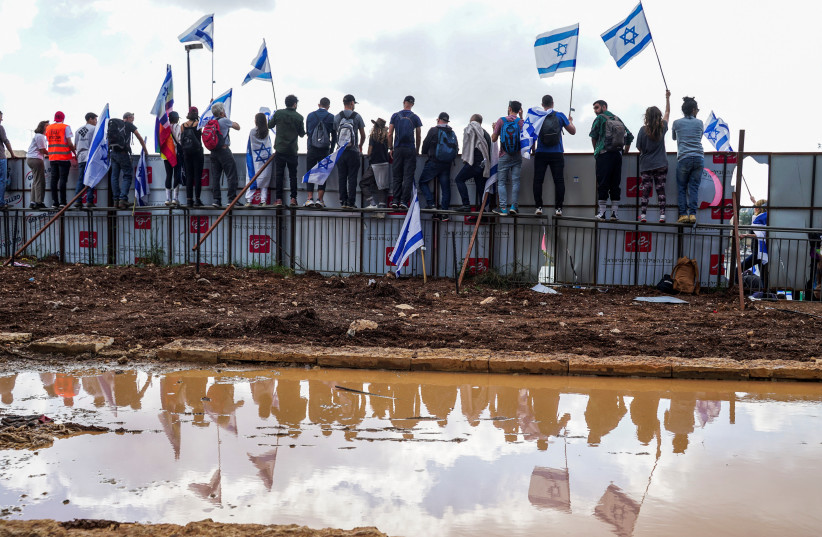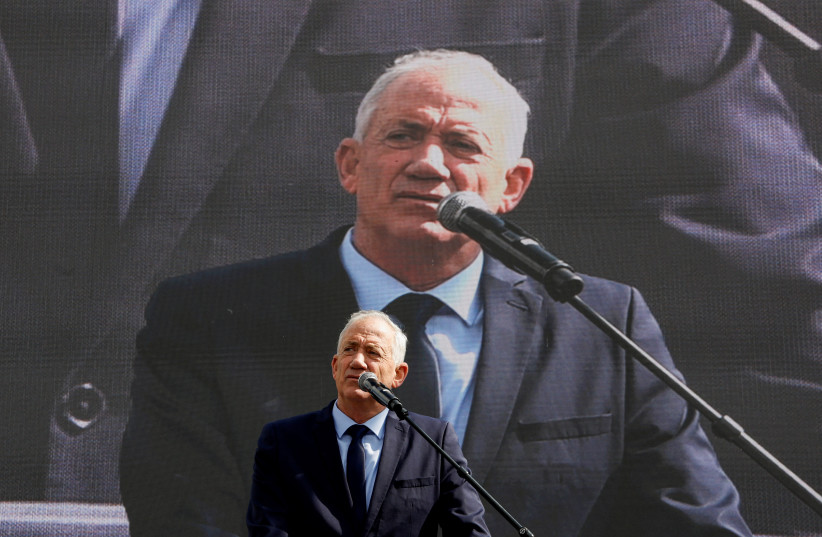The turmoil over Israel’s democracy reached its peak on Sunday and Monday, beginning with Prime Minister Benjamin Netanyahu’s firing of Defense Minister Yoav Gallant and ending with the launching of consensus talks on judicial reform.
The two days of pitched emotions capped three months of dramatic debate between the Right and the Left about how to save Israeli democracy.
At issue is the fast-tracked judicial overhaul plan that the Right believes will save democracy and the Left fears will turn the country into a dictatorship.
Within a 48-hour period that included Netanyahu firing Gallant and the launching of consensus talks, the domestic turmoil, which included a nationwide labor strike and huge protests, reached fever pitch.
As tensions calm slightly, here are 10 takes that look at some of the wins, losses and implications.

1. Israeli democracy flexing its muscles
Israel is a country whose democracy has already been eulogized – but on Monday, it showed that pronouncements about the demise of civic freedoms have been premature.
The ability of so many Israelis to nonviolently voice their dissent was a testament to the vibrancy and the strength of democracy, irrespective of opinions on judicial reform.
The Histadrut national labor union declared a strike that closed Ben-Gurion Airport, as well as banks and malls, and hundreds of thousands of Israelis spontaneously held protests throughout the country.
The events generated a wave of hope that ordinary citizens could affect policy.
2. Anti-judicial overhaul activists make change
Netanyahu’s decision to suspend for a month the final vote on a bill to empower politicians to select Supreme Court justices signaled an initial victory for opponents of the government’s judicial change plan.
This was followed by an agreement from him to hold consensus talks with the opposition, in an effort to broker a compromise bill.
But the victory comes at a potential cost. Monday’s massive protest came after a three-month build-up of rallies.
The month of negotiations will occur around the Passover holiday as well as Remembrance Day for the Fallen of Israel’s Wars and Victims of Terrorism, and Independence Day. As the public turns its focus to other things and the talks offer the possibility of a solution, the momentum of activity could be lost. It could be more difficult to spontaneously generate a second round of mass protests, if needed, that would be powerful enough to stop government action in its tracks.
3. Netanyahu keeps coalition but takes a political hit
The prime minister kept his coalition and his party intact, despite initial threats by some ministers to quit should he suspend the legislation.
Initially, it seems as if Netanyahu would have to choose between his government and the demands of the protesters. At times during the day, it seemed like the government could collapse, sending the country to new elections.
But polls by channels 11 and 12 showed Netanyahu’s popularity tumbling by seven seats from the 32 he received in last November’s election. His support has not been this low for a decade.
4. Consensus talks finally begin
Netanyahu has been under domestic and international pressure to hold consensus talks from the moment the government began fast-tracking judicial reform legislation in the Knesset this winter. The opposition had insisted that such talks could only be held if legislative work was suspended; the government insisted that talks should happen concurrently. Until Monday, there did not appear to be a way to bridge those differences.
The timetable for consensus talks on judicial reform between opposition and coalition politicians facilitated by President Isaac Herzog is tight – just one month.
But the fact that they are being held at all, offers the hope that if successful they could provide a model for the rest of the reform process that could quell opposition fears and end the internal turmoil that has dominated the process.

5. Gantz’s popularity rises
The day’s events turned into a political victory for National Unity leader MK Benny Gantz, with a Channel 11 poll giving him and the party he leads 21 seats and Channel 12 allocating him 23 seats, compared to the 12 he received in the November 2022 elections.
Those results placed the former defense minister back in contention as a potential prime ministerial candidate, a place he had held in the elections of 2019 and 2020. They jettisoned him to a position on par with opposition leader MK Yair Lapid (Yesh Atid), who was Netanyahu’s chief rival in the last election.
Lapid received 22 seats in both polls, a drop from the 24 he garnered in the 2022 election.
The Channel 11 poll showed that 37% of those polled thought Gantz was most suited to be prime minister, compared to Lapid at 32% and Netanyahu at 30%.
6. Gantz renews ties with Netanyahu
Gantz has skillfully branded himself as one of the leading politicians pushing for a consensus-based process in a way that could be amenable to the coalition.
Netanyahu actually thanked Gantz in his Monday night speech for his “good faith” efforts and called on others to follow his example.
The two politicians appeared to be reestablishing ties, after their bitter disputes caused the government to collapse in December 2020. It’s an important step, because Gantz is believed to be a potential political partner for Netanyahu should any of the coalition partners quit the government.
7. Gallant becomes a hero
Defense Minister Yoav Gallant became the sudden hero of the anti-judicial reform movement for standing up to Netanyahu. Gallant warned him that a contentious judicial reform process harmed the country’s security and asked him to suspend the proceedings. He did so, even though it could cost him his job.
8. Gallant isn’t fired?
Netanyahu announced on Monday that he had fired Gallant from his post for his opposition to judicial reform, a move which was one of the catalysts for Monday’s massive protest. Gallant has, however, remained in his post and has yet to receive an official dismissal letter. As of Tuesday, it was unclear if he would be let go or reinstated. Until the matter is clarified, he remains the country’s defense minister.
9. Ben-Gvir to get National Guard
National Security Minister Itamar Ben-Gvir secured a written pledge from Netanyahu that he would be given control of the country’s nascent national guard used to quell riots and maintain order in public events. In exchange, he agreed not to pull his Otzma Yehudit Party out of the coalition, a move that would have caused the government’s collapse.
Netanyahu promised Ben-Gvir he would hold a government vote this Sunday to cement the deal.
10. Coalition still holds legislative cards
The bill that allows politicians to select Supreme Court judges has been one of the more contentious pieces of legislation within the judicial reform process. It has now passed all preliminary votes and bureaucratic steps. Should consensus talks fall apart, the coalition can bring the legislation to a vote at any moment.
